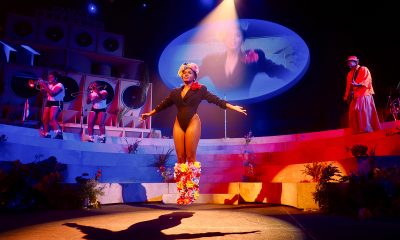Arts & Entertainment
Queen of everything
Boy George chats up his new album, tour and how he got his mojo back
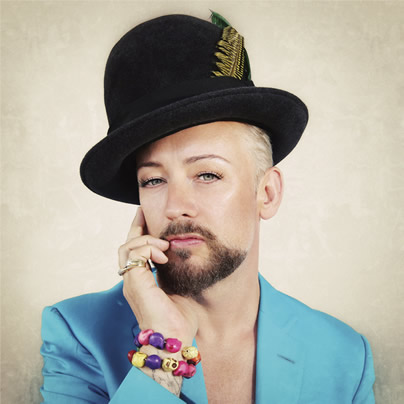
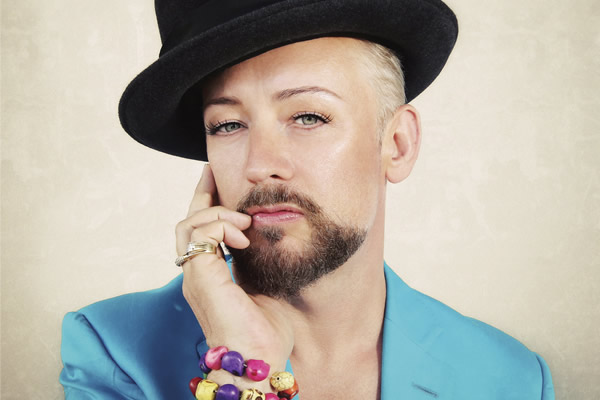
Boy George says in some ways straight acts can experiment with gender more than gay artists. (Photo courtesy High Rise PR)
Boy George
Monday, April 21
9:30 Club
815 V St. N.W.
930.com
$35
Doors open at 7 p.m.
Boy George is the first to acknowledge a cliché.
Getting sober in 2008 and turning 50 two years ago are big “take stock” moments for many and no less so for him.
“It was a huge turning point for me,” he says of his milestone birthday. “I thought, ‘I’ve got to get my shit together, I’ve got to focus, this is important.’ I just felt I’d wasted a lot of time. I looked at myself and thought, ‘God, I’ve done nothing.’ I know I’ve done a lot, I’ve always worked. I’ve grafted and always made money, but a lot of it was pointless because no one knew what I was doing.”
This year, the world is seeing the fruit of those epiphanies. His new album “This Is What I Do” was out in the UK last fall and officially drops in the U.S. with three bonus cuts on March 25. The last several years have seen him release a spate of side projects of various scope, but this is his first full-fledged solo album since 1995’s “Cheapness and Beauty.” He starts a U.S. leg of his tour on April 18 in Philadelphia and plays D.C.’s 9:30 Club on April 21.
During a Saturday afternoon phone chat from his London home last weekend, George — in his ever-delightful, clipped British accent — was chatty, self deprecating, quick to laugh and balked or sidestepped no questions. His comments have been slightly edited for length.
WASHINGTON BLADE: I know you’ve been DJing a lot and working on various things, but how did it work out that you released a new album at this time? Why now?
BOY GEORGE: Well, you know, as you said, I’ve been DJing very happily for the last 25 years and I haven’t really had a record deal for a long time. I suppose I have thought about making records but, you know, I wasn’t sure how I was going to do it. You know, whether I was going to sign with a major label or do something more independent. I also changed management a couple of years ago and wanted to kind of start fresh with a bunch of people that perhaps could kind of see beyond what I was. I think when you’ve had a very, very successful career like I had in the ‘80s, people tend to kind of hope you’re going to try and repeat that. They’re always waiting for you to write the next “Karma Chameleon,” but it’s never going to happen (laughs). Everything I’ve ever done has been kind of instinctual and impulsive and spontaneous and I’ve never really been the kind of artist that can kind of just pull it out of a hat. I have to feel it. … I just felt it was the right time. We discussed the different ways I could go about making a record and I decided to be brave and pay for it myself and own it myself which is a new thing for me, kind of a grown up move. And so far, you know, it’s been the right choice.
BLADE: When was it recorded and how long did it take?
GEORGE: We started about March last year and we did it within about four months. Not solidly. We recorded and then somebody else mixed it. I would say about four to five months last year.
BLADE: How was the reception in the UK last fall?
GEORGE: We’ve had amazing reviews. Comeback of the year, Boy George has finally got his mojo back, you know, blah, blah, blah. Lots of compliments. I mean, much to my surprise really, because I wasn’t really sure what kind of reaction I would get. I wasn’t sure what to expect. So yeah, everything in the UK has been kind of another surprise. England tends to get much more excited about Beyonce than anything that comes from here. It’s like all America, America, hip-hop, Beyonce, Lady Gaga. Nobody cares about Boy George anymore (laughs). That’s why I’m relying on you guys in America.
BLADE: The first single “King of Everything” says “What is the word on the street? Have I lost my crown?” Have you?
GEORGE: Well, the song isn’t just about me, it’s about everyone. It’s about human frailty, people messing up, which is a very human thing, yet it is also about me but it’s about you, it’s about everyone. It’s not literal. The crown is a metaphor. If it was about me, I’d call it “Queen of Everything.”
BLADE: How did the UK tour go last fall?
GEORGE: It was amazing. Very small, very affectionate and the audiences were adorable. They were mostly the kind of hardcore fans, so they were really affectionate.
BLADE: About how long do you usually play?
GEORGE: It depends on the curfew. We do about an hour and a half, maybe two hours. Not quite Bruce Springsteen-length. But we play for as long as we can. When you’re doing a show, sometimes if the mood is right, you can keep it going, depending on the audience reaction, really. But obviously some venues have a curfew so you can’t play longer than a certain time.
BLADE: About how much of the new album do you work into the set list?
GEORGE: We kind of try and balance it with things people know, some things people haven’t heard, some new stuff, some old stuff. You know, I’ve been doing this a while and one thing I’ve continued to do is to play live. At the end, you have to figure out a way to reach the audience.
BLADE: How does the new stuff sit with the Culture Club hits? Is it hard to build a set list that flows?
GEORGE: No, I don’t think it’s difficult. With the things people know, you’re always in a very safe area. If you sing a song that’s been a hit, that’s very safe so no, I wouldn’t say it’s difficult. There are certain songs that I don’t do. Obviously with that kind of a back catalogue, there are some songs you grow into and some that you say, “OK, this doesn’t really speak to who I am anymore.” So you kind of try to mix it up and keep it interesting, not just for the audience but also for yourself. You don’t want it to be a kind of robotic show that’s the same every night. Myself and John, who plays guitar in my band, we have sections where we do acoustic stuff and we can do all sorts of things there and change things around and do new things. That helps keep the show exciting.
BLADE: Do you still have the goatee?
GEORGE: I do.
BLADE: Your look at present seems more kind of genderfuck than androgynous. Just a whim or do you feel more comfortable with mixing in masculine elements than you have in previous years?
GEORGE: I just had some time off and didn’t shave for a few days and kind of looked at myself and thought, “Oh, I quite like this look.” It’s not something I really sat down and thought about. I just kind of grew my beard when I was on break and other people seemed to like it and other people didn’t like it, which made me want to keep it more. I might get bored with it at some point but I’m loving it at the moment.
BLADE: Lots of pop stars have played around with androgynous looks — I’m thinking of David Bowie and Prince — and the public seems to accept them as straight. You were always pretty much out for the most part. Do you feel the public overall has pretty good gaydar?
GEORGE: I don’t know really. I think there are some audiences that don’t really want to know, depending on the artist. Sometimes people have this kind of spare-me-the-details kind of attitude. I think it’s more about what kind of artist you are and in what ways you want to affect the audience. That’s the starting point for me. It’s about what’s going to make you happy, do you know what I mean? How much of yourself you reveal. I think it’s much easier for somebody straight to play around with these boundaries because they’re not being defined by their sexuality. If you’re gay, then you’re gay and you have to strike a sort of balance so people don’t feel you’re flaunting it in their face or preaching, you know. I think as a gay artist, you have to walk a much finer line than, say, somebody who’s just having a flirtation with this. I mean, it’s much easier for someone straight like Macklemore to sing a song with the word gay in it. A few years ago I made an album called “Cheapness and Beauty” and there was a song called “Same Thing in Reverse” and I was told categorically this will never, ever get played on the radio because I used the phrase “kamikaze queer” in it. You can get away with more when you’re straight.
BLADE: You’ve talked about making a new album with Culture Club this year. Is that still in the cards?
GEORGE: Yes, we are looking at the possibility of recording some stuff this year but at the moment, we’re kind of still in the writing stages. We’ve had some great sessions and we really did enjoy ourselves and it was a really nice experience. Everybody came away feeling really good about it and, you know, we’re going to see what we can do next.
BLADE: It’s so great to see you looking so good, sounding so good and apparently really thriving. A few of your contemporaries who were also huge in the ‘80s haven’t fared as well. What did you think and feel when you heard Michael Jackson and Whitney Houston had died?
GEORGE: Oh my God, you know, I mean Michael Jackson. And I loved Whitney Houston like so much. I was just a massive, massive fan. I loved her voice. And Michael Jackson, you know, I was at home when it happened and I just remember thinking, “Oh my God, this is so sad.” You know, he was such an incredible artist. For the last few years of his life, I felt like there was so much pressure on him and he looked world-weary every time I saw him. I felt such sadness for him. I was just so sad when he died and Whitney, what a shame for both of them. They were great, great artists. I was a huge Michael Jackson fan and a huge Whitney Houston fan and I’m not ashamed to say I did cry. I thought it was really sad.
BLADE: Conversely does it make you happy when you see some of those artists still doing well today. Like Cyndi Lauper, for instance, just won a Tony.
GEORGE: I’m always happy when anyone does well. That’s a measure of maturity, I think. Cyndi’s a friend. I haven’t seen her for a while, but she’s a great girl and, you know, yeah, I think when you see your contemporaries doing well, it gives you hope. You think, “OK, anything’s possible.”
BLADE: You recognized early on that fame was fickle and I remember you telling Johnny Carson you knew staying at that level at the height of Culture Club was not sustainable and that you envisioned yourself eventually writing songs for other artists and doing other things. How has that played out differently than you thought it might have when you were 22?
GEORGE: Oh, I think when you’re 22 you really think you know it all, don’t you? (laughs) You listen back to the things you say and you think, “Oh my God, you really thought you knew it all.” And I think at that age, you’re still learning so much. I feel very fortunate to still be doing what I love.
BLADE: Yes, but it struck me as rather insightful that you realized even then that pop careers always ebb and flow.
GEORGE: It may be one of the reasons I’ve done other things. I’ve never wanted to just rest on my laurels. I don’t have the idea of trying to kind of repeat something. So in a way, DJing has been an incredible second career for me. When I first started it, my manager at the time thought it was a really bad idea and told me I shouldn’t do it. But again, I just followed my instincts and it was the right thing to do because it allowed me to avoid nostalgia. I’ve been able to be involved in a quite progressive industry and not have to worry about what I used to be or, you know, the ‘80s, and all that stuff. So I’m really happy that I made that decision. I like to work. I’m a worker and I’m always up for a new challenge.
BLADE: Back in the early ‘90s, the theme from “Crying Game” was this huge out-of-nowhere smash radio hit in the U.S. Do you still sing it live?
GEORGE: From time to time. Actually, maybe that’s a good one to put into the set in America. I’ll write that down.
BLADE: Is it harder to break a song in the U.S. now than it was years ago? Not even with yourself, necessarily, but just in general?
GEORGE: I don’t know what it’s like now because I’m not involved in that kind of trying to have hits, you know. I think past a certain age, you’re just kind of marginalized in the world anyway.
BLADE: Does that bring with it artistic freedom?
GEORGE: I think it does. Once you kind of get over the shock and the horror that certain radio stations won’t play your new stuff no matter how good you are, I mean that’s really the bonkers thing. I’m not sure it’s as bad in America as it is here, but certainly here, it’s just ridiculous. But it kind of remains to be seen. It’s a very different landscape now. Making records is very different and the way we promote ourselves is very different. In a way I’m kind of starting again, so I’ll let you know.
BLADE: How many of the players from the album do you tour with?
GEORGE: All of them.
BLADE: The album has such a lush sound — is that easy to duplicate on stage?
GEORGE: Well, we have a nine-piece band that we’re touring with at great expense so we probably won’t be making any money. But I think it’s really important to have a great band and we had a great time in the UK last year. We do England and Europe then we go to America. We’ll be steaming by the time we get to the states.
BLADE: How long have you been a vegan?
GEORGE: I’m not strictly a vegan but I’m very conscious about what I eat and I don’t eat a lot of dairy, though I do eat some cheeses. I’ve been on a very particular metabolic plan diet for two years that’s all about your hormonal reaction to certain foods so some of the stuff I don’t eat is very random — like pumpkin, kale, onion or lemon. It’s very individual and different for each person. It’s been sort of life changing for me but I don’t really call myself anything because then you eat a piece of cheese and everybody freaks out.
BLADE: And you run too?
GEORGE: Well, I exercise.
BLADE: Is the U.S. version of the album the same?
GEORGE: No, it’s got more songs. I wrote a song called “Turn On a Little Light For Me,” which I wrote especially for the American album and which I love. We were asked by the label to provide some more stuff and I had a couple covers — “Video Games” by Lana Del Rey and the Bob Dylan song “Make You Feel My Love,” but I didn’t just want covers as the bonus content so I wrote a new song too. It’s about hope. A lovely kind of little Dylan-esque kind of song.
BLADE: Thanks for your time.
GEORGE: Thank you.
Out & About
Plan your wedding the LGBTQ way
Washington D.C. LGBTQ+ Wedding Expo scheduled for Sunday
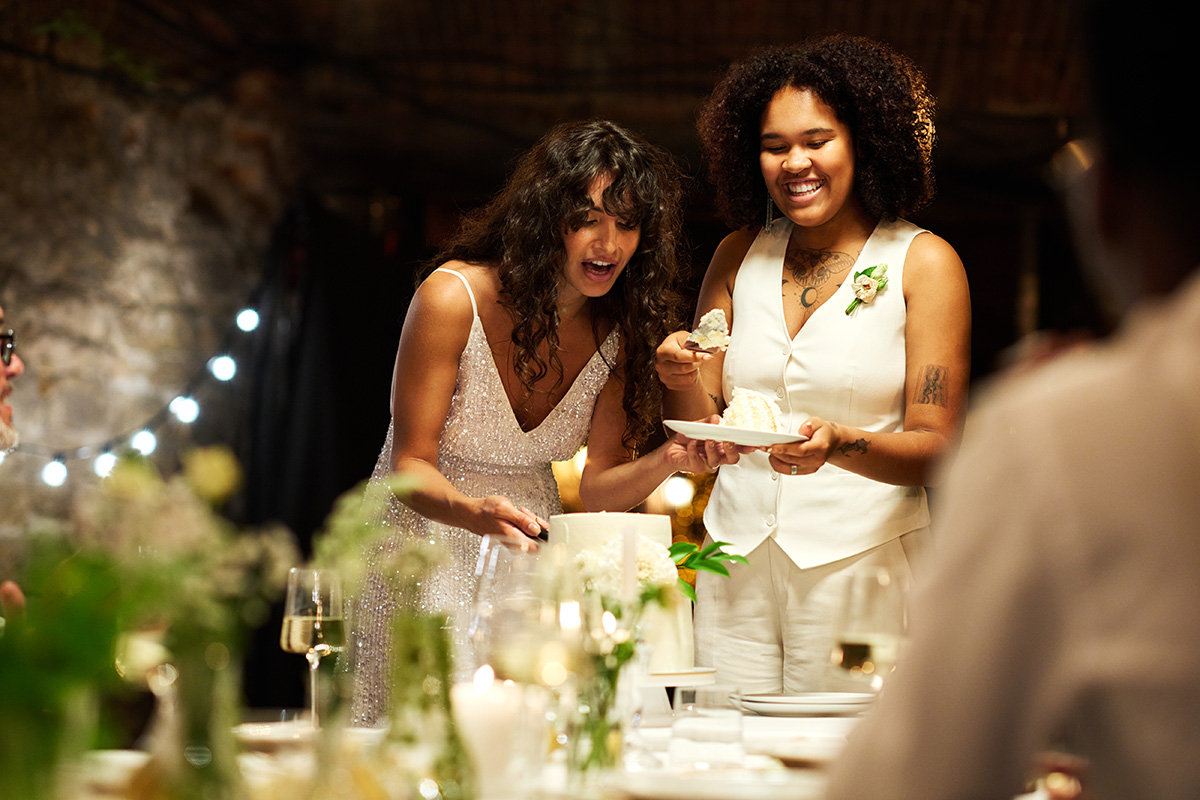
Rainbow Wedding Network will host “Washington D.C. LGBTQ+ Wedding Expo” on Sunday, March 1 at 12:30 p.m.
Guests can meet and mingle with a curated selection of LGBTQ-welcoming wedding professionals from across the region, each ready to help bring your vision to life, and spend a beautiful afternoon exploring everything they need to create a celebration that reflects them.
There will be a relaxed, self-guided look at the Watergate’s spaces and amenities, savor signature cocktails and delicious tasting samples, and connect with other couples who are on the same journey.
Visit Eventbrite to reserve a spot.
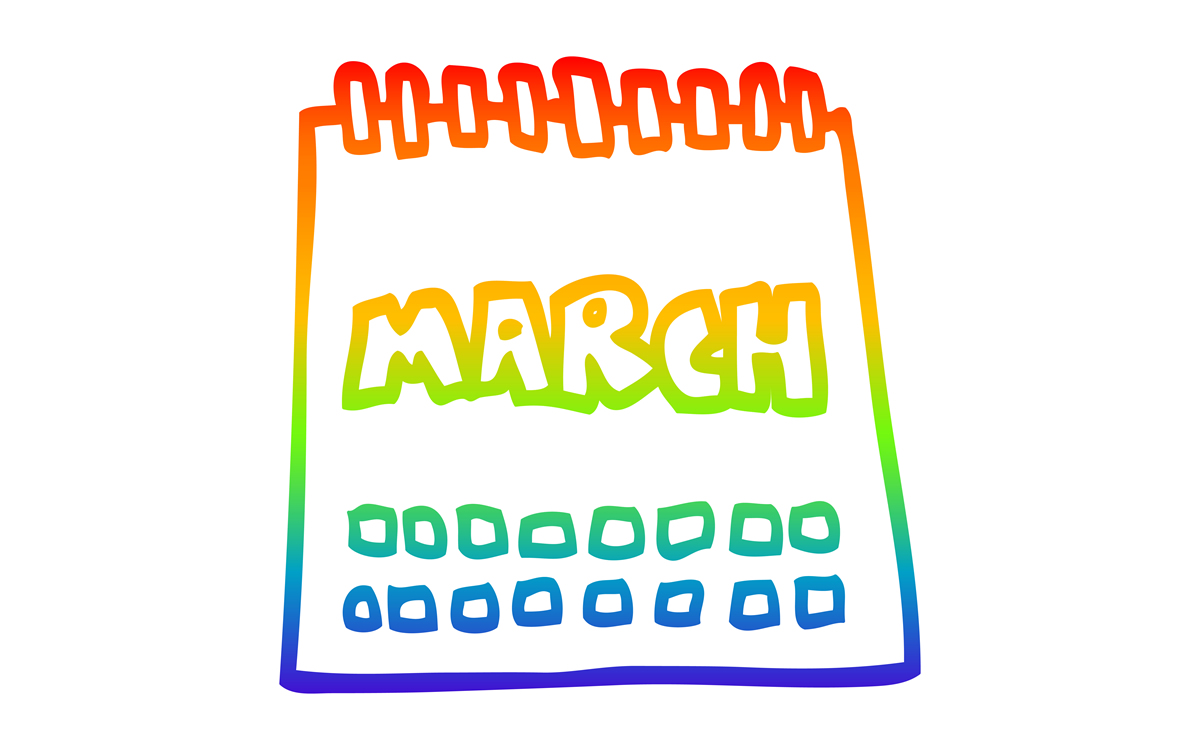
Friday, February 27
Center Aging Monthly Luncheon With Yoga and Drag Bingo will be at 12 p.m. at the DC Center for the LGBT Community. Email Mac at [email protected] if you require ASL interpreter assistance, have any dietary restrictions, or questions about this event.
Go Gay DC will host “LGBTQ+ Community Happy Hour Meetup” at 7 p.m. at Freddie’s Beach Bar and Restaurant. This is a chance to relax, make new friends, and enjoy happy hour specials at this classic retro venue. Attendance is free and more details are available on Eventbrite.
Trans Discussion Group will be at 7 p.m. on Zoom. This group is intended to provide an emotionally and physically safe space for trans people and those who may be questioning their gender identity/expression to join together in community and learn from one another. For more details, email [email protected].
Saturday, February 28
Go Gay DC will host “LGBTQ+ Community Brunch” at 11 a.m. at Freddie’s Beach Bar & Restaurant. This fun weekly event brings the DMV area LGBTQ+ community, including allies, together for delicious food and conversation. Attendance is free and more details are available on Eventbrite.
The DC Center for the LGBT Community will host “Sunday Supper on Saturday” at 2 p.m. It’s more than just an event; it’s an opportunity to step away from the busyness of life and invest in something meaningful, and enjoy delicious food, genuine laughter, and conversations that spark connection and inspiration. For more details, visit the Center’s website.
Black Lesbian Support Group will be at 1 p.m. on Zoom. This is a peer-led support group devoted to the joys and challenges of being a Black lesbian. You do not need to be a member of the Beta Kappa Chapter or the Beta Phi Omega Sorority in order to join, but they do ask that you either identify as a lesbian or are questioning that aspect of your identity.Send an email to [email protected] to receive the zoom link.
Sunday, March 1
LGBTQ+ Community Coffee and Conversation will be at 12 p.m. at As You Are. This event is for people looking to make more friends and meaningful connections in the LGBTQ community. Attendance is free and more details are available on Eventbrite.
Monday, March 2
“Center Aging: Monday Coffee Klatch” will be at 10 a.m. on Zoom. This is a social hour for older LGBTQ+ adults. Guests are encouraged to bring a beverage of choice. For more information, contact Adam ([email protected]).
Tuesday, March 3
Universal Pride Meeting will be at 7 p.m. on Zoom. This group seeks to support, educate, empower, and create change for people with disabilities. For more details, email [email protected].
Wednesday, March 4
Job Club will be at 6 p.m. on Zoom upon request. This is a weekly job support program to help job entrants and seekers, including the long-term unemployed, improve self-confidence, motivation, resilience and productivity for effective job searches and networking — allowing participants to move away from being merely “applicants” toward being “candidates.” For more information, email [email protected] or visit www.thedccenter.org/careers.
Center Aging Women’s Social and Discussion Group will be at 6 p.m. on Zoom. This group is a place where older LGBTQ+ women can meet and socialize with one another. There will be discussion, activities, and a chance for guests to share what they want future events to include. For more information, email [email protected].
Thursday, March 5
The DC Center’s Fresh Produce Program will be held all day at the DC Center for the LGBT Community. People will be informed on Wednesday at 5 p.m. if they are picked to receive a produce box. No proof of residency or income is required. For more information, email [email protected] or call 202-682-2245.
Virtual Yoga Class will be at 7 p.m. on Zoom. This free weekly class is a combination of yoga, breathwork and meditation that allows LGBTQ+ community members to continue their healing journey with somatic and mindfulness practices. For more details, visit the DC Center’s website.
a&e features
Transmission DC breathes new life into a storied sound space
A fresh home for boundary-pushing culture on H Street

Late last year, phoenix-style, a fresh home for boundary-pushing culture arose on the H Street corridor. Transmission DC – a queer, trans, and POC-owned, operated, and centered community-focused venue – powered on in the former home to the Rock & Roll Hotel (famously, not a hotel, but very much rock & roll). Transmission (1353 H St., N.E.) arrives secure in its mandate – or even birthright – to provide a place to celebrate creativity and music through a lens of inclusivity and respect.
Transmission’s team brings experience, but also representation. Owners/partners Kabir Khanna (who is also programming director), Katii B, Ellie McDyre, and Kelli Kerrigan together previously managed 618 productions, a venue in Chinatown, crafting “some of D.C.’s freakiest parties, raves, and mosh pits” they note.
They packed up operations last fall to a space curated specifically for D.C.’s underground music and culture scene, building their efforts in Chinatown to bring in more fans in queer and POC circles.
Transmission, Khanna points out, is built on DIY values. In the music scene, DIY means that promoters and organizers – often disconnected from the mainstream and part of marginalized communities – build shows and programs collaboratively, but independently from institutions, supporting each other as smaller, independent venues close. Here, Transmission aims to ensure that those putting together these underground inclusive shows have a more permanent and stable home, can have access to resources, and can provide more sustainable income to artists. “We’re trying to get more people to support and enjoy the music, and also give artists and organizers within the DIY community more structure and a larger cut,” says Khanna.
Khanna also notes that Transmission operates “under the principles of safety, inclusivity, and respect.” McDyre added that even at venues that claim inclusivity, that statement might not take place in practice. We’re “not just pitting up a rainbow flag,” says McDyre, but as some of the owners are trans and POC, audiences can see themselves reflected at the top.
Much like the DIY nature of the music community, the Transmission owners brought a DIY ethos to turning around their space.
In March 2020 – the height of COVID lockdowns – Rock & Roll Hotel suddenly shuttered, though not due to the pandemic; instead, the venue claimed that decreasing sales and increasing competition led to the closure. For 14 years, it was the central spot for cheap beer and lesser-known and celebrated acts. The space stood vacant for more than five years, until Transmission turned the power back on.
“When we got into the space, it was effectively abandoned for years,” says Khanna. “There was a ton of mold, and paint primer covering all surfaces. It was nearly falling apart.” Khanna noted that many music venues like this one, regardless of how well it was maintained, “get the shit kicked out of it,” given the nature of shows. The team called in mold removal contractors, ripped up most of the floorboards, and started fresh.
Transmission’s first floor is styled as a stripped-down black box: the better to take in the music. “It’s minimal on purpose to act as a canvas for set design and music,” without a specific aesthetic, says Khanna. Moving upstairs, the second floor has been opened up, removing some walls, and now has a larger dance area than the first floor. Beyond the first two performance levels, and a holdover from Rock & Roll Hotel, is the rooftop. Though without a stage, the rooftop space is filled with murals splashed across the walls, with a full bar. Transmission’s current capacity is 496, but the team is looking to grow that number. Transmission will also leverage the full kitchen that Rock & Roll Hotel operated, bringing in Third Hand Kitchen to offer a variety of food, including vegan and vegetarian options.
Khanna pointed out an upcoming show reflective of Transmission’s inclusive ethos: Black Techo Matters on Feb. 27. The event is set to be “a dynamic, collaborative night of underground electronic music celebrating Black History Month.” Khanna says that techno came from Black music origins, and this event will celebrate this genesis with a host of artists, including DJ Stingray 313, Carlos Souffront, and Femanyst.





